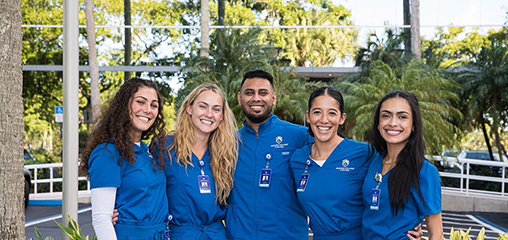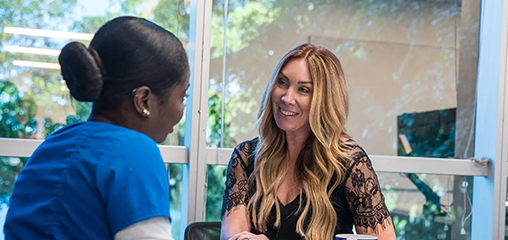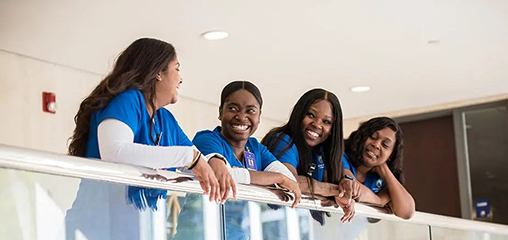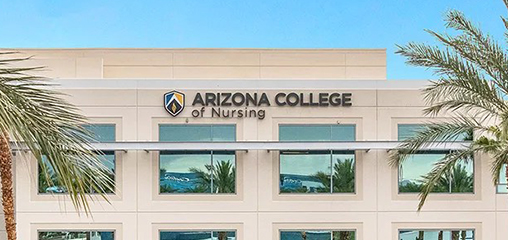
From Classroom to Clinical Confidence
Arizona College of Nursing prepares you with practical, hands-on training that supports your success in real healthcare settings
Classes begin March 2nd
Scrubs. Stethoscope. Scenarios.
Collaborating with your peers in our advanced Simulation Labs is one of the most engaging and memorable parts of your nursing education at AZCN.
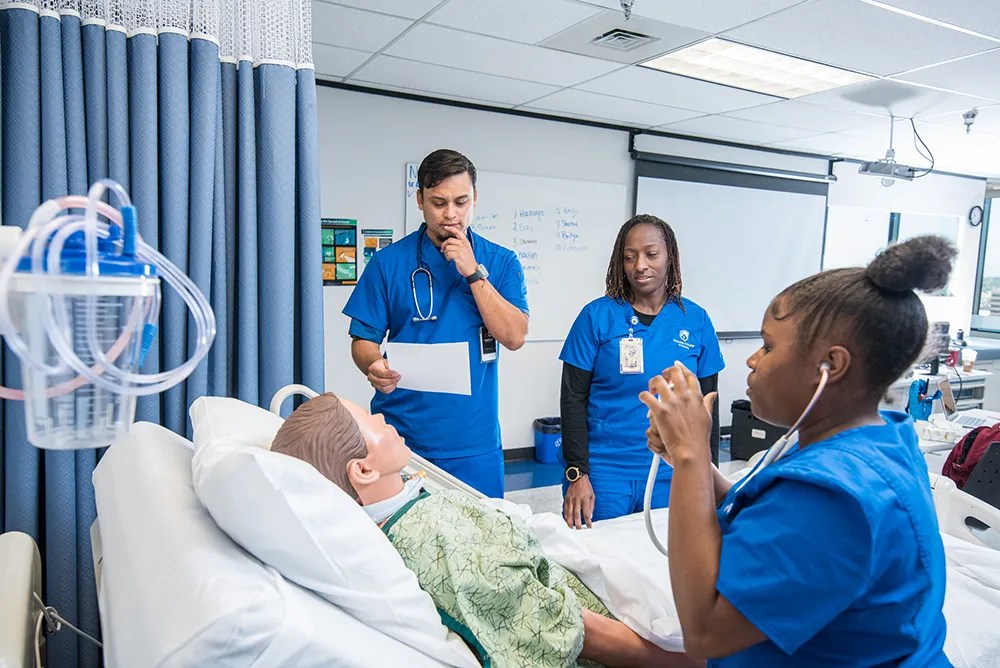
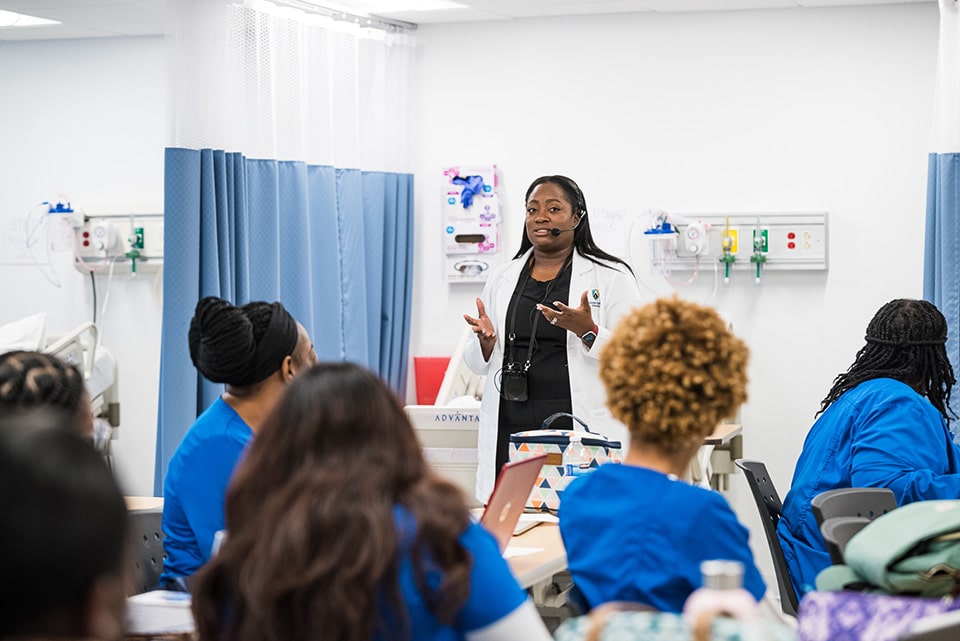

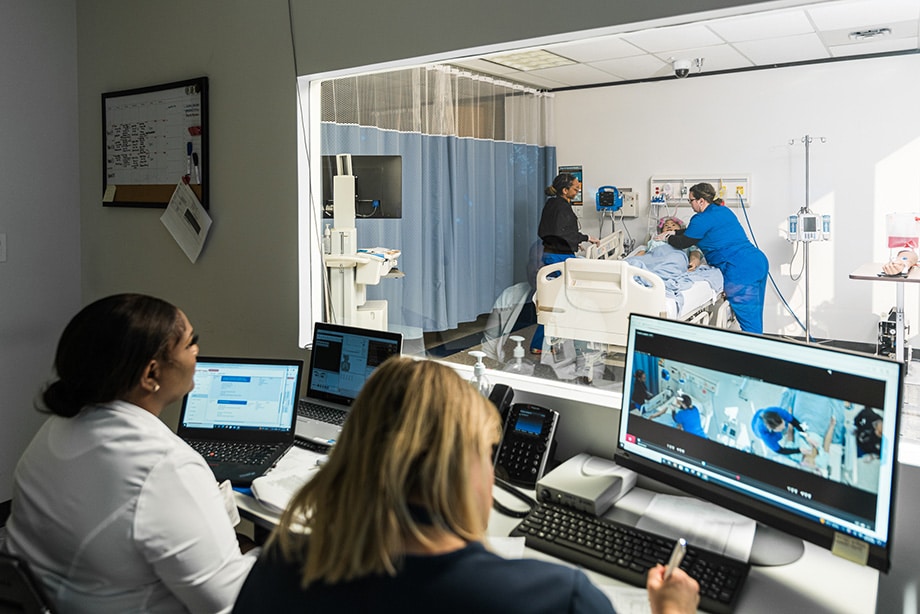
Practice with Purpose: Simulation-Based Learning
Simulation Labs, a key part of our BSN program, offer a safe, supportive environment where you can develop your clinical skills, think critically, and learn through hands-on experience. You’ll work with high-fidelity mannequins—life-like “patients” that can breathe, bleed, and respond to care—under the guidance of experienced instructors.
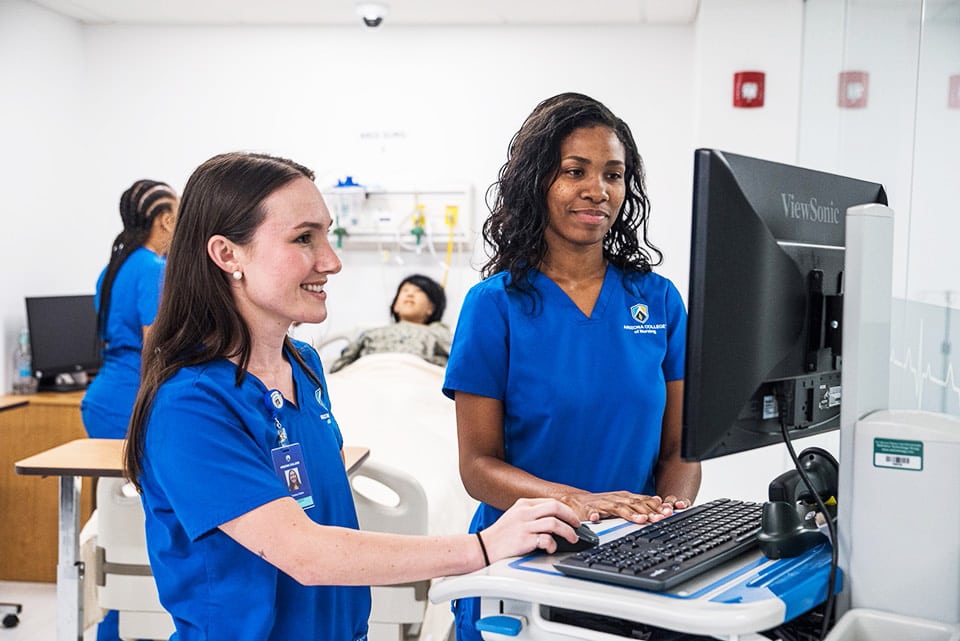
These immersive labs are designed to replicate a wide range of healthcare settings, including:
- Hospitals and delivery rooms
- Nursing homes and clinics
- Acute care environments
- Schools and community centers
- Home health settings
How the AZCN Sim Lab Works: Building Confidence Through Realistic Practice
What you’ll see in this video:
- Complete walkthrough of a typical sim lab day
- How students practice with life-like mannequins in realistic scenarios
- The importance of debriefing and reflection in simulation-based learning
- How sim lab experience builds confidence for clinical rotations
- Real student feedback about feeling more prepared and confident
Step inside Arizona College of Nursing’s advanced simulation lab and discover how our students build the confidence and skills they need for real-world nursing practice.
Our sim lab provides a safe, supportive environment where nursing students can practice clinical skills with high-fidelity mannequins in realistic hospital scenarios. From pre-briefing and skills review to hands-on scenarios and meaningful debriefing sessions, this video shows you exactly how the AZCN sim lab experience works.
Whether you’re considering nursing school or curious about how simulation training prepares future nurses, this behind-the-scenes look at the AZCN sim lab shows how we’re preparing students for success in their nursing careers.
Clinical & Nursing Skills Lab Experiences at AZCN
Hands-on learning is at the heart of your nursing education at AZCN. You’ll gain extensive experience in both clinical and lab settings to prepare you for a wide range of real-world healthcare environments.
Your program includes:
- 630 clinical hours in a variety of inpatient and outpatient settings
- 270 lab hours focused on building and reinforcing practical nursing skills
Students rotate through multiple clinical sites, including hospitals, clinics, and community-based facilities, ensuring exposure to diverse patient populations and specialties. Our well-rounded nursing program experience helps you develop adaptability, confidence, and a strong foundation for your future role as a nurse.
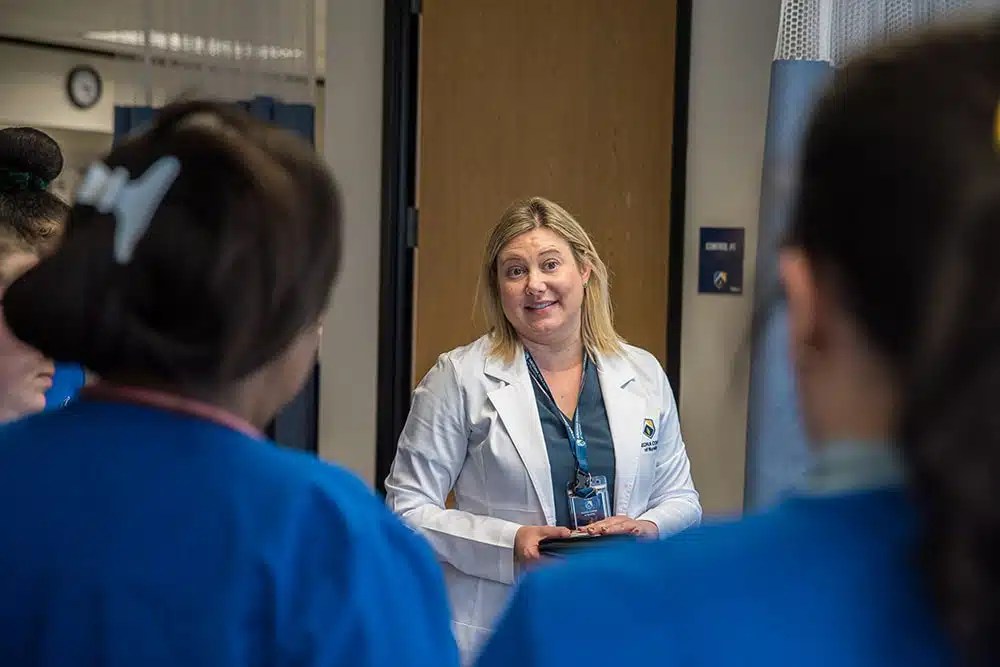
General Nursing Skills and Science Lab FAQs
Yes, your nursing degree from AZCN prepares you for more than just hospital work. Many graduates go on to work in public health, schools, outpatient clinics, community organizations, and home health care. The variety of clinical settings you’ll experience can help you explore these options and figure out what feels like the best fit. Nursing is a flexible field, and your degree gives you a foundation to branch out beyond traditional roles if that’s your goal.
While you’re earning your nursing degree, you’ll have access to faculty guidance, academic advising, and skills support outside of scheduled labs and clinicals. Many programs also offer tutoring, study resources, and peer support options to help you stay on track. It’s important to ask about these resources early so you know what’s available. Staying connected with instructors and classmates can also make a big difference in your overall experience.
A standardized patient is a person trained to consistently act out a patient role in a clinical scenario. This allows you to practice communication, assessment, and care techniques with someone who can respond in real-time. It helps simulate realistic patient interactions in a low-risk setting. These sessions are used to support your skill development in areas like bedside manner and clinical reasoning.
A debrief happens after a simulation and gives you a chance to reflect on what happened in the scenario. You’ll talk through your decisions, review key actions, and connect the experience to broader nursing concepts. This step helps turn practice into learned nursing skills. It’s not just about what you did, but why you did it—and how you can improve.
Simulation-Based Training at AZCN
At AZCN, simulation is a key part of how we prepare you for real-world clinical practice. Through immersive, interactive experiences—both in-person and virtual—you’ll build the confidence, clinical judgment, and communication skills needed to care for patients safely and effectively.
Simulation activities are integrated throughout our nursing program to align with what you’re learning in class and in clinical settings. You’ll take part in realistic patient scenarios, structured skills review, and guided debriefings that reinforce core concepts and promote clinical decision-making. These experiences give you the opportunity to apply your knowledge in a nursing simulation environment, allowing you to learn from each case and enter your clinical rotations feeling prepared and capable.
You’ll complete 50 hours of in-person clinical simulations. Virtual simulation is an option for clinical replacement as needed.
In addition, there are opportunities available each semester to sharpen your skills before entering clinical environments.
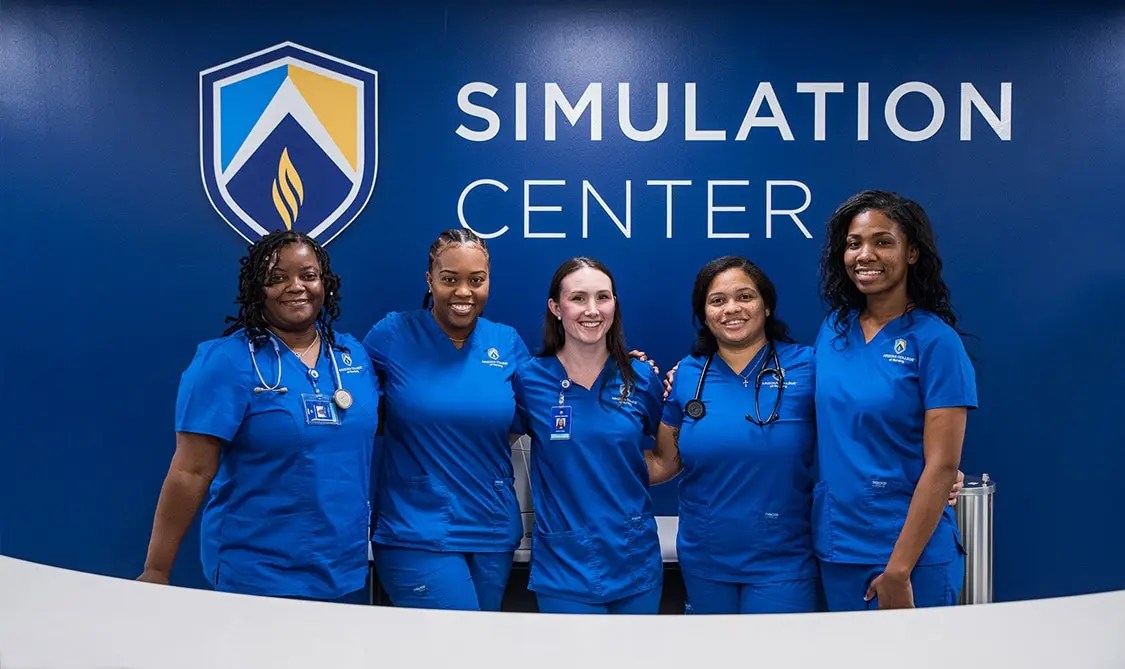
Nursing Skills and Science Simulation FAQs
Simulation training is a vital component of the nursing program at AZCN, contributing to the development of clinical competencies required for graduation. The hands-on experience gained through simulations complements academic learning and clinical rotations, ensuring a well-rounded education. Successfully completing simulation requirements is essential for earning your nursing degree.
AZCN’s simulation program is distinguished by its integration of high-fidelity simulations, experienced faculty guidance, and alignment with current healthcare practices. Our program’s emphasis on realistic scenarios, comprehensive debriefings, and continuous curriculum updates ensures that you receive high-quality training. This commitment to excellence prepares you to excel in diverse healthcare environments.
Simulation training includes scenarios that mimic emergency situations, such as trauma, stroke, or post-partum hemorrhage cases. These high-pressure simulations help you develop quick decision-making skills, prioritize patient care tasks, and work effectively under stress. Practicing these scenarios enhances your readiness to handle real-life emergencies confidently.
Simulation gives you a controlled environment to practice skills and decision-making without real patient risk. Clinical rotations, on the other hand, place you in active healthcare settings where you work alongside licensed professionals. Both are required parts of nursing education but serve different purposes. Simulation helps prepare you for clinicals by letting you apply your knowledge before working with real patients.
In-Person Simulation Experience
Your in-person simulation sessions provide rich, realistic clinical learning in a safe environment where you can apply classroom knowledge to patient care. Key features include:
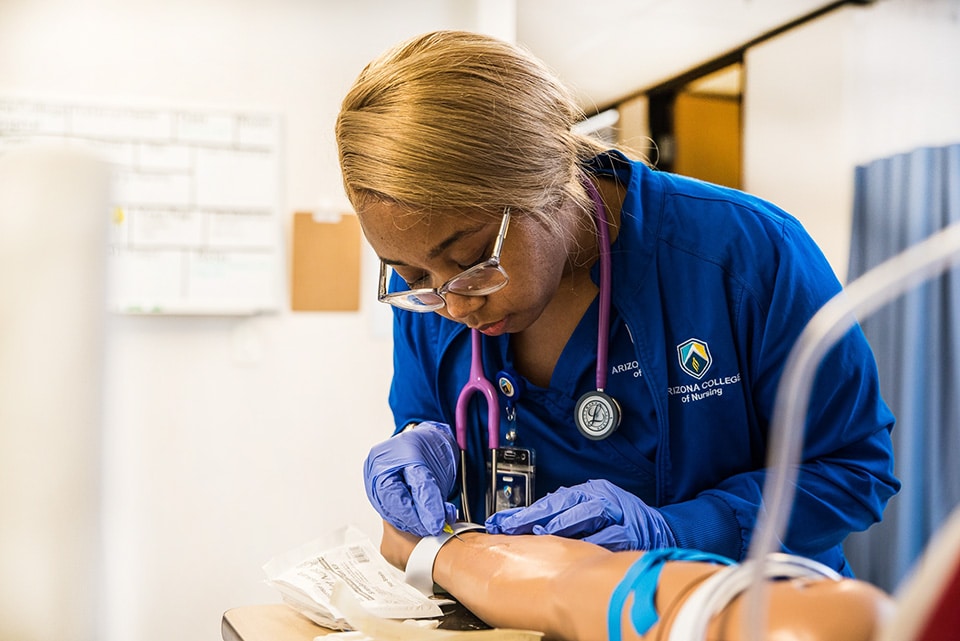
- High-fidelity simulators for lifelike clinical scenarios
- Standardized patients (faculty trained to portray patient roles)
- Embedded simulation personnel to support and guide scenarios
- Skills review sessions focused on essential clinical procedures
- Livestream and video playback for observation and guided reflection
Simulation based learning experiences also help inform curriculum decisions, ensuring your education stays aligned with real-world expectations and best practices in nursing care.
Virtual Simulation Experience
Virtual simulation offers a flexible yet highly interactive way to strengthen your clinical decision-making in a real-time, faculty-led setting. Because you complete these scenarios independently, virtual simulation gives you a valuable opportunity to assess your own decision-making, rather than relying on group input like in traditional in-person simulations. It’s offered as an option to support reaching the required clinical hours for each course and follows a structured flow that includes:
- A prebrief to set expectations and prepare for the scenario
- A split scenario with two phases and a mid-point check-in
- A closing debrief to reflect on your decisions and reinforce learning
Virtual simulations mirror the engagement and educational value of in-person experiences. Student learning outcomes from both formats are used to continually shape and improve the nursing curriculum.
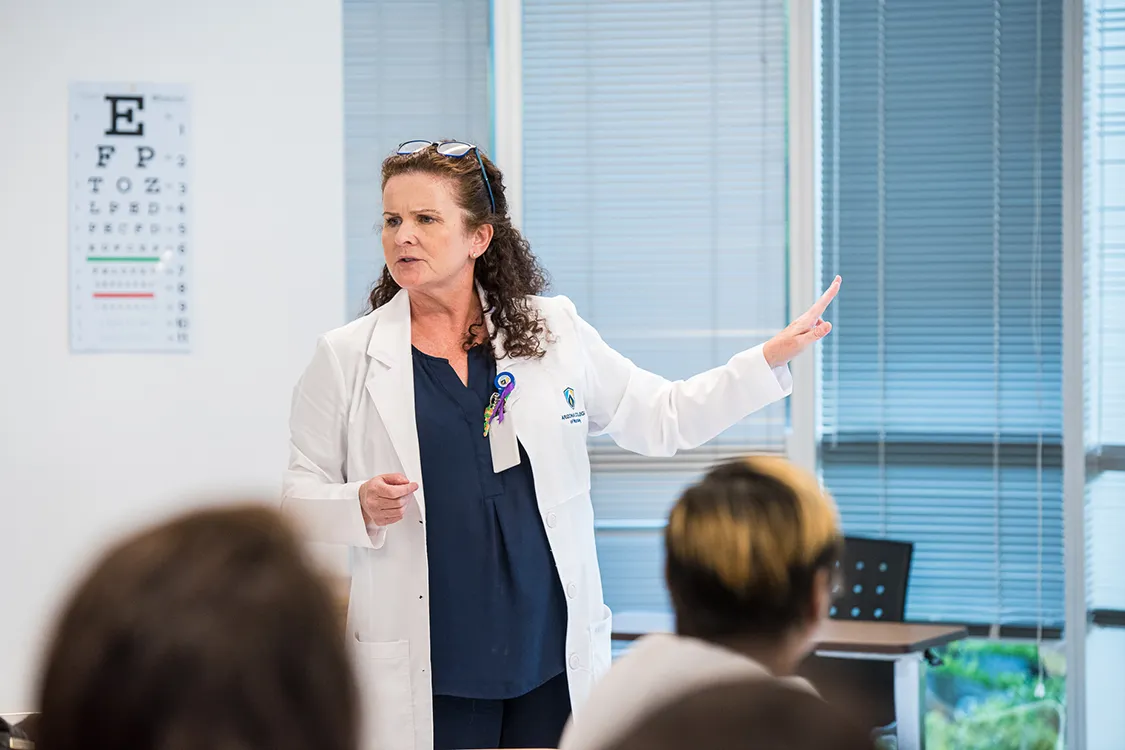
BSN Program Resource Links
Preparing for the NCLEX – RN is an essential part of your journey to becoming a licensed registered nurse, and it’s fully integrated into the Arizona College of Nursing curriculum. From day one, you’ll engage with content, assessments, and resources designed to build the clinical judgment and critical thinking skills needed for the exam. Learn more about how we support your NCLEX – RN success here: https://www.arizonacollege.edu/accredited-bsn-program/nclex-exam-prep/
Curious about what you’ll be learning throughout our BSN program? Our course descriptions offer an in-depth look at the subjects, skills, and competencies covered in each class, from foundational sciences to advanced nursing practice. Learn more about our BSN program course descriptions here:
https://www.arizonacollege.edu/accredited-bsn-program/bsn-program-course-descriptions/
New to nursing terms? We’ve put together a BSN Glossary to help you get familiar with the language you’ll see throughout our BSN program. It’s a quick, helpful resource whenever you need clarity. Browse our glossary here: https://www.arizonacollege.edu/accredited-bsn-program/nursing-school-glossary-terms/
Our BSN program curriculum is thoughtfully designed to take you from the basics to advanced clinical skills with a clear, supportive structure. You’ll complete a mix of general education courses, nursing theory, labs, clinical experiences, and simulation — all built to prepare you for real-world nursing. Learn more about our BSN program curriculum here: https://www.arizonacollege.edu/accredited-bsn-program/curriculum/
Our BSN program is a direct path toward earning your nursing degree and starting a meaningful career in healthcare. Learn more about our BSN program here: https://www.arizonacollege.edu/accredited-bsn-program/.
